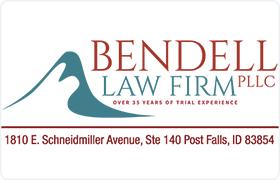Cusick Criminal Lawyer, Washington
Sponsored Law Firm
-
 x
x

Click For More Info:
-
The Bendell Law Firm, PLLC
1810 E Schneidmiller Ave, Suite 140, Post Falls, ID 83854» view mapCriminal Defense, Accident & Injury Law You Don’t Pay If We Don’t Win
With deep experience and a multi-faceted perspective and understanding of Idaho and Washington law, we can help you achieve the best results in a variety of practice areas.
208-981-0555
Robert Alan Simeone
Personal Injury, Bankruptcy, Criminal, Workers' Compensation
Status: In Good Standing *Status is reviewed annually. For latest information visit here Licensed: 44 Years
Michael Dimock Smith
General Practice
Michael Dwayne Smith
Litigation, Juvenile Law, State Government, Criminal
Scot D. Stuart
Criminal, Real Estate, Commercial Real Estate
Gary George Weber
Juvenile Law, Criminal
Gregory Lawrence Hicks
General Practice
Status: In Good Standing *Status is reviewed annually. For latest information visit here Licensed: 40 Years
Michael Joseph Carbone
Criminal
Ashley Ann Stetson
Criminal
Status: In Good Standing *Status is reviewed annually. For latest information visit here Licensed: 11 Years
Joseph L. Broadbent
Traffic, Federal Appellate Practice, Criminal, Constitutional Law
Status: In Good Standing *Status is reviewed annually. For latest information visit here Licensed: 30 Years
Cheryl Taylor
Criminal
 James Bendell Post Falls, ID
James Bendell Post Falls, ID Practice AreasExpertise
Practice AreasExpertise